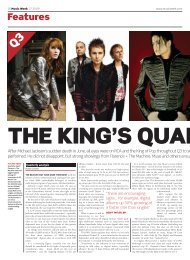Remake, Remodel: The Evolution Of The Record Label
Remake, Remodel: The Evolution Of The Record Label
Remake, Remodel: The Evolution Of The Record Label
You also want an ePaper? Increase the reach of your titles
YUMPU automatically turns print PDFs into web optimized ePapers that Google loves.
This pre-draft version is strictly for review purposes only and is not for general dissemination or sharing.<br />
delivered in dozens of different formats with technical variations. This is a long way<br />
from the simple origination of a compact disc.<br />
<strong>The</strong> management of this complexity has become a requirement and a specialty of the<br />
record company.<br />
As Martin Mills says, ‘More is required of a label as it is a more complex business<br />
today, even down to boring things like managing metadata.’<br />
<strong>The</strong> balancing act of running two parallel businesses<br />
From more or less a standing start as late as 2003, digital sales now account for over 20<br />
per cent of the recorded music market in the UK 25 . <strong>The</strong> major focus of companies in<br />
looking to the future has been on digital and new models of business, and the growth in<br />
online sales is the result of this.<br />
But at the same time, the vast majority of the sales line continues to be the physical CD.<br />
<strong>Record</strong> companies have to manage two parallel businesses – each with very different<br />
dynamics. And they are doing this while managing a declining overall sales line with a<br />
resultant pressure on overheads.<br />
Boyd Muir Executive Vice President and CFO, Universal Music Group International,<br />
highlights the difficulties with shifting into new business avenues. ‘It probably takes 80<br />
per cent of our effort to do 20 per cent of the business,’ he says. ‘I spend a huge amount<br />
of my time figuring out things we don’t know about.’<br />
Complexity was often cited in talking to industry people in relation to the making sense<br />
of data.<br />
Forecasting income and cash flow, as well as budgeting, has had to evolve quickly from<br />
models that were driven primarily by album and single sales income to models that aim<br />
to capture all income streams to give a total revenue picture.<br />
As Shabs Jobanputra says, ‘We have a per-month target of revenue and profit, regardless<br />
of releases.’<br />
Chris Ancliff General Counsel-International, Warner Music Group, talked about the range<br />
of product types in digital (streaming, download, subscription etc.) and how this knocks<br />
on into the complexity of contracts and royalty accounting. ‘It needs more dedicated<br />
people to be looking after deals with services and telcos and a label can provide these<br />
people,’ he says. ‘A label brings an understanding of the marketplace.’<br />
Alison Wenham highlights the importance of labels’ skills and infrastructure in<br />
managing the often-complex picture of licensing as ‘rights management is more<br />
complicated today so acts really need an expert.’<br />
25 Combined digital revenues across singles and albums now account for 23.4% of the value of the<br />
recorded music market – ERA UK Statistics 2010 – last accessed 09.05.11<br />
34



